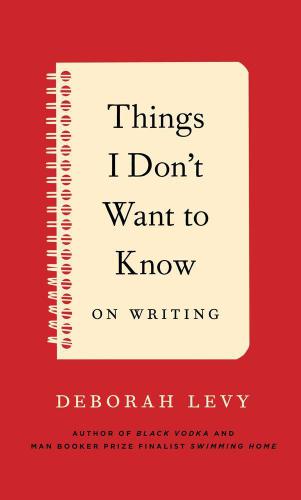
Things I Don't Want to Know
On Writing
- اطلاعات
- نقد و بررسی
- دیدگاه کاربران
نقد و بررسی

Starred review from March 17, 2014
Author of the Man Booker Prize shortlisted Swimming Home offers a slim, nuanced autobiography that addresses Orwell’s timeless question of “Why I Write” from a woman’s perspective. Levy begins with a trip to Majorca on which she mysteriously packs one of her old notebooks, labeled “POLAND 1988”, not knowing why she has brought it with her. The incident prompts Levy to recall how she used Polish menus from the notebook in her acclaimed novel, “in which the cabin crew on LOT airlines had morphed into nurses from Odessa.” The memoir’s project becomes evident in Levy’s precise methods of showing how unrelated incidents from her life and experience become fodder, through the subconscious mind’s unknowable alchemy, for her fiction. The precise, visceral scenes soon give way to a more philosophical tone as Levy sets about to deconstruct and analyze what it means to be a woman writer, quoting such luminaries as Adrienne Rich and Marguerite Duras. Her South African childhood, her father’s abduction, and the family’s later expatriation to England form the remainder of the slender memoir’s narrative, and she continues to link lived experience to her development and process as a writer. Particularly fond of greasy spoon restaurants in England, she begins to write as a teenager inside their “steamed up windows and haze of cigarette smoke,” a “sense of urgency accelerated.” At these junctures, in which Levy explores the consciousness and central questions of a writer (“I was convinced there was another sort of life waiting for me”), this dreamlike book of ideas and memories displays its greatest strengths.

May 15, 2014
A slim, elliptical memoir from novelist, poet and playwright Levy.Only in the most expansive terms can this be considered a book "on writing," as it is subtitled, though it could be considered a portrait of the writer as a young girl. Most of it at least, for the framing is plainly the author's adulthood, before the publication of her well-received novel Swimming Home (2011). It begins: "That spring when life was very hard and I was at war with my lot and simply couldn't see where there was to get to, I seemed to cry most on escalators at train stations." Levy provides no context for her existential crisis, but she recounts her geographical cure to Majorca, where she shared a restaurant table with a Chinese man, who asked her where she was born. She writes, "I'm not sure I went on to say everything you're going to read now." Levy was born in apartheid South Africa, living in Johannesburg, when her father was imprisoned for being a member of the African National Congress. The author then lived with her godmother, where she didn't quite fit with the family and, perhaps symbolically, freed a bird from its cage (as she'd desired to do for her caged father). Eventually, her father was freed, and the family exiled itself to England, where Levy wondered, "How was I ever going to escape from living in exile? I wanted to be in exile from exile." Her full-circle return to the Majorca of the book's beginning brings a perspective informed by politics, feminism, and the challenge and redemption of writing: "What do we do with knowledge that we cannot bear to live with? What do we do with the things we do not want to know?"Readers get only a vague sense of what these things we don't want to know might be in a book that seems like a catharsis for the writer but might prove enigmatic for most readers.
COPYRIGHT(2014) Kirkus Reviews, ALL RIGHTS RESERVED.

June 1, 2014
In her feminist answer to George Orwell's 1946 essay "Why I Write," Levy (Swimming Home; Beautiful Mutants; The Unloved) muses on her life experiences, using as her chapter headings Orwell's four motivations for writing: Political Purpose, Historical Impulse, Sheer Egoism, and Aesthetic Enthusiasm. As a child living in South Africa, she felt the sting of apartheid's cruelty at an early age. Not only did Levy see the "White Only" signs everywhere, but she watched her father's arrest for being an African National Congress member. The family's move to London when she was nine left her feeling displaced and sad, especially after her parents separated. As a teen she decided to be a writer, hanging out in the local greasy diner, dressed in a black straw hat and green platform shoes. Later, at age 50, while in Mallorca, she reflects on the expectations society places on women. VERDICT Levy successfully weaves historical, political, and personal threads together to form a nuanced account of her life and why she writes. Her graceful memoir/essay emphasizes a woman's need to speak out even if she has to use a quiet voice. For feminists and memoir enthusiasts.--Nancy R. Ives, SUNY at Geneseo
Copyright 2014 Library Journal, LLC Used with permission.




دیدگاه کاربران